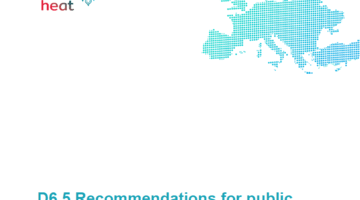D6.5 Recommendations for public authorities
Heating and cooling (H&C) accounts for about half of Europe’s total energy needs with 75% still dependent on fossil fuels. Thus, rapid and significant change is needed to reach the EU 2050 goals and action must be taken at local level involving a variety of stakeholders.
On top of emissions reduction, H&C planning focuses on other challenges of European cities like energy, poverty, energy efficiency, dependency on fossil fuels and stability. However, cities often lack the resources or tools to bring this planning forward.
The aim of the Act!onHeat project is to accelerate the use of strategic heating and cooling planning in cities and regions throughout Europe. The project identified the success factors of strong and efficient existing heating and cooling plans and developed a workflow for strategic H&C planning based on existing open-source tools, Hotmaps and THERMOS.
The present report summarises a set of recommendations for public authorities based on the findings of the project’s work and Support Facility. The Act!onHeat Support Facility aimed to boost the optimisation of thermal systems by implementing an accelerated number of district H&C projects across Europe, enabling local authorities, utilities and industries to reach their decarbonisation goals. Several local and regional governments, energy agencies, and city planners received support for the following modules:
● Module 1: on H&C transition strategy development ● Module 2: on project feasibility, including financial studies
Act!onHeat partners implemented the Support Facility along the project lifetime, gaining unique insights on local H&C planning that led to the present set of recommendations for public authorities.

Publication date:
Subscribe to our Newsletter

This project has received funding from the European Union’s Horizon 2020 research and innovation program under grant agreement No 101033706. The sole responsibility for the content of this website lies with the Act!onHeat project and does not necessarily reflect the opinion of the European Union.




